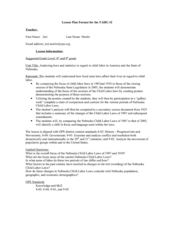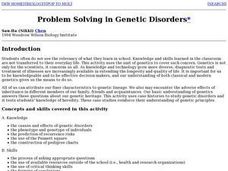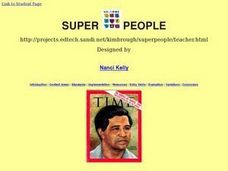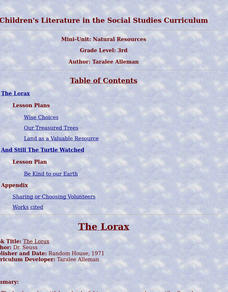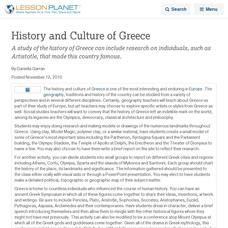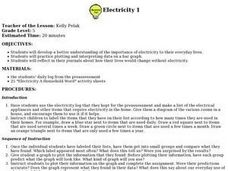Curated OER
Make That Shot!
Students figure out basic percentages by shooting paper balls into a basket, recording results, and calculating individual and team percentages for ten shots.
Curated OER
Kaffir Boy
Students explore the concepts of intolerance and racism in the autobiography Kaffir Boy written by Mark Mathabane. The lesson reveals the story's depiction of the terrible toll of apartheid on the lives of individuals.
Michigan Sea Grant
Fish Identification
Using a dichotomous key, pupils identify characteristics of fish who live in the Great Lakes and explain how these features help them survive. In small groups, class members discover what features scientists consider important and...
Curated OER
The Sparkplugs: Special Occasions for Writing In the History Classroom
Students are to discover ways in which to spark their interest in writing. As a class, they examine the purpose and function of political conventions. Individually, they role-play they are a page at a National convention and identify...
Curated OER
Child Labor
Students examine how how groups and institutions work to meet individual needs and promote the common good, and identify examples of where they fail to do so. They describe how workers with specialized jobs and the ways in which they...
Curated OER
Law & Ethics for Photojournalists
Students identify and discuss First Amendment rights, examine how to make sound legal judgements regarding photographs of private individuals, examine difference between public and private figures as far as libel law is concerned,...
Curated OER
Macro-DNA: Doing DNA Fingerprinting
Students explore gel electrophoresis using paper models. They model DNA sequences and shade the boxes on their Gel Electrophoresis Sheet which represent the individual fragments.
Curated OER
Lamarck Is Dead!
High schoolers read Lamarck's obituary and respond to questions.Students can work individually or in small groups.This activity can be used at the beginning of an evolution unit.
Curated OER
Problem Solving In Genetic Disorders
Young scholars explore the causes and effects of genetic disorders. They examine the phenotype and genotype of individuals and predict the recurrenence risks. Students generate a Punnett square and construct pedigree charts.
Curated OER
What's in a Name? The Use of Native American Images in Sports
Students discuss and analyze the pros and cons of using Native American names and images to represent sports teams. Using primary sources, including position statements from Native American tribes, interviews with school alumni and...
Curated OER
SUPER PEOPLE
Second graders study the talents and interests that have helped people to "make the world better." They begin by reading a story about 5 individuals who have "made a difference." This webquest extends this exploration by guiding the...
Curated OER
Archaeology and Storytelling
Students identify and interpret both individual families and whole cultures learn about their pasts by collecting and analyzing stories and artifacts. Then they identify that not all archaeological finds readily reveal their history to...
Curated OER
A Peaceful Place Is Powerful for the Mind
Fourth graders explore, analyze and interpret how schools can become peaceful places to learn and interact with others. They study a wide variety of avenues to achieve this task through classroom, community and career activities...
Curated OER
A Century of Challenge and Change: The Filipino American Story
Students recognize the events that led to the Philippine Revolution. For this Philippine Revolution lesson, students relate the causes of the Philippine Revolution to situation in the world today. Students examine the Philippine Equation...
Curated OER
Land as a Valuable Resource
Students investigate why the soil is important to our lives. In this natural resources lesson, students have a farmer as a guest speaker. Students begin to understand how farmers use and protect our natural resource. Students write...
Curated OER
Metis
Fifth graders investigate the development of Canada. In this Metis people lesson, 5th graders create a replica of the Red River Cart. Students work in groups or individually to brainstorm materials that they will need to build their...
Curated OER
Pioneer America: Legendary Westerners - Can One Person Really Make a Difference?
Fourth graders research famous Americans from the Westward Movement and complete an interview. In this Westward Movement lesson plan, 4th graders work in pairs to research someone who was important during this time period. They prepare...
Curated OER
Portfolio Power
Students explore how portfolios are a marketing tool for job seeking. In this employment lesson, students identify parts of a professional portfolio and the importance of having one as a perspective employee.
Curated OER
History and Culture of Italy
Italy is the birthplace of countless individuals who changed the course of human history.
Curated OER
History and Culture of Greece
A study of the history of Greece can include research on individuals, such as Artistotle, that made this country famous.
Curated OER
The Sporting Life
Students read and discuss "When the Games Began: Olympic Archaeology," examining the significance of the first Olympic Games in Greece. They research and reenact scenes from these Games and reflect on the Games' original importance.
Curated OER
Famous Person - Who Am I?
Students have an important historical figure on a card on their back and by giving them clues, students have to determine who they are. In this historical figure lesson plan, students compete to find out who they are first.
Curated OER
State of the "States"
Students consider indicators that mark a country's progress, examine how last year's State of the Union address has affected U.S. foreign policy, research issues deemed important in that speech, and create report cards assessing the...
Curated OER
ELECTRICITY 1
Fifth graders examine the importance of electricity to their everyday lives, practice plotting and interpreting data on a bar graph, and reflect in their journals about how their lives would change without electricity.




